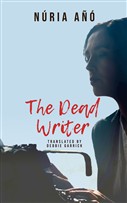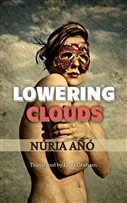Núria Ańó is a Catalan/Spanish writer, translator and speaker at international conferences, where she usually talks about literary creation, the cinema, cities or authors like Elfriede Jelinek, Patricia Highsmith, Salka Viertel, Alexandre Dumas fils, Franz Werfel or Karen Blixen. She has shown her work at the following universities and institutions: Lleida University (UdL), Túnez University, Jaen University (UJA), The International University of Andalucia (UNIA), The High Council for Scientific Investigation (CISC-Madrid), The Sysmän Kirjasto Library in Finland, The Writers’ Association of Shanghai (SWA), Fudan University in China, The East China University, Sinan Mansion, The Instituto Cervantes in Shanghai, the Conrad Festival in Poland, the Massolit Bookshop, Bar Bazza and the Instituto Cervantes in Krakow along with other libraries and secondary or higher education establishments. She is also a member of various juries at international competitions. Some of her works, including novels, short stories and essays have been published and translated into Spanish, French, English, Italian, German, Polish, Chinese, Latvian, Portuguese, Dutch and Greek.
Her first published novel Els nens de l’Elisa ([The children of Elisa] Omicron, 2006) was awarded third prize in the 24th Ramon Llull Novel Award, one of the most prestigious awards for Catalan literature, awarded by Editorial Planeta. L’escriptora morta ([The Dead Writer, 2020] Omicron) was published in 2008; Núvols baixos ([Lowering clouds, 2020] Omicron) in 2009; La mirada del fill ([The son’s gaze] Abadia) in 2012; El salón de los artistas exiliados en California ([The Salon of Exiled Artists in California, 2020), a biography on Jewish screenwriter Salka Viertel.
Núria won the 18th Joan Fuster Prize for Fiction Ciutat d’Almenara, fourth place for international writing at the 2018 Shanghai get-Together and has been awarded with prestigious international grants: Nuoren Voiman Liitto (Finland, 2016), Shanghai Writing Program (China, 2016), Baltic Centre (Sweden, 2017), IWTCR (Greece, 2017), Krakow UNESCO City of Literature (Poland, 2018), IWTH (Latvia, 2019) and IWP (China, 2020).
Her writing centres around the characters’ psychology, often through the use of anti-heroes. The characters are what stands out most about her work, they are generally more relevant than the topic itself. With her feminine, somewhat sentimental introspection, she finds a unique balance between the marginal worlds of parallels. Her novels are open to a wide variety of topics, they deal with important social and current themes like injustice or lack of communication between individuals. The basic plot of her novels does not tell you everything there is to know. By using this method, Ańó attempts to involve the reader so that they ask their own questions to discover the deeper meaning of the content.






